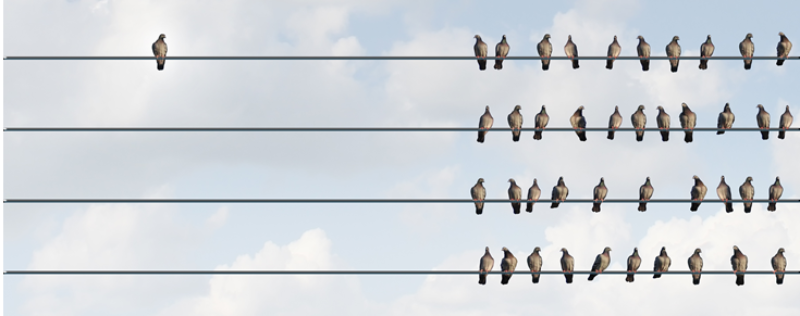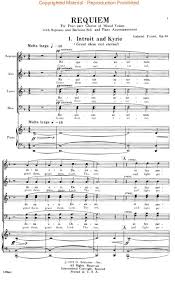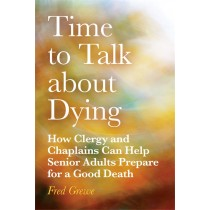
Imogene had been a hospice patient for several months and lived with her daughter Bonnie in a very small travel trailer. She slept on a little cot in the midst of a forest of unread paperback books and magazines. Bonnie slept next to her mother on another cot.
Less than five feet tall and weighing less than 80 pounds, Imogene was still a very intimidating personality. She was very precise in what she liked and didn’t and let everyone know it. Normally on my visits, Imogene talked non-stop (with great bravado), recounting familiar stories of her broken marriages, her two children, her years of unfulfilling work, her in-your-face life philosophy, her unrealized dreams, and her indomitable spirit. Her son lived out of the area and out of Imogene’s life, so Bonnie was left to faithfully provide the constant care Imogene now required.
Maybe it was the cramped quarters. Maybe it was the pain of Imogene’s cancer. Or maybe it was just too many years of toiling at tedious, unrewarding work—but in the months I had known Imogene, I had seen how she and Bonnie could get on each other’s nerves.
On one of my visits Bonnie was out running some errands, so I was alone with Imogene. Uncharacteristically, Imogene shared in a vulnerable manner the underside of her life narrative. She told me how as an unmarried teenager, pregnant with Bonnie, she had to drop out of school and was never able to formally complete her education. This was a defining experience in Imogene’s life. Believing she was exceptionally gifted intellectually, but unable to gain the formal recognition, she had to settle for a less-than life. Was this why she occasionally made little digs about Bonnie’s weight?
That’s the backstory.
I honestly don’t know how or why, but on a subsequent visit with these women at the stuffed little travel trailer I was witness to a miracle.
Everything started off as usual. I asked if Imogene was in any pain. “No more than usual,” she said, then added, “But I know I’m getting close to the end…and it’s OK.” The bravado was absent as she began to tenderly recount the same stories I had heard on so many previous meetings. The bitterness and frustration over unfulfilled opportunities was mysteriously gone. I was even more amazed as Imogene began to praise Bonnie, who was sitting next to her. “You know, I love my son…but Bonnie’s the one who really loves me and has come to care for me when I needed her. She’s a great daughter—and I’m so proud of her.”
And then Bonnie chimed in, “Mom, I’m so proud of you. I’m proud of the way you never stopped learning. You couldn’t go back to school, but you never stopped learning…and you’ve taught all of us the importance of education. You didn’t let anything stop you. You got us all through.”
I remained in hushed silence as for more than an hour these two beautiful broken souls spoke words of love and acceptance to each other, expressing deep words of appreciation for what is so special and unique in the other. It was a miracle. When wounded souls bless each other, it always is.


 These days, it’s so easy to get “sucked in” by the bad news of the day. One counter measure we can employ to help protect our souls during times like these is to take a more macro view of our lives. The following portion of a prayer by Oscar Romero, a Catholic Bishop in El Salvador who was martyred in 1980, is a great example of considering the longer view.
These days, it’s so easy to get “sucked in” by the bad news of the day. One counter measure we can employ to help protect our souls during times like these is to take a more macro view of our lives. The following portion of a prayer by Oscar Romero, a Catholic Bishop in El Salvador who was martyred in 1980, is a great example of considering the longer view.
 There’s a tale from the Jewish tradition that speaks of heaven and hell.
There’s a tale from the Jewish tradition that speaks of heaven and hell. 

 Looking for a Place to Fit
Looking for a Place to Fit Rudy was a devout atheist who regularly attended the First Presbyterian Church. Actually, that’s where we met, sort of. It’s not that Rudy was looking to convert from atheism—he just loved to sing, and being in the Presbyterian choir gave him a chance to share the beauty of his deep bass voice.
Rudy was a devout atheist who regularly attended the First Presbyterian Church. Actually, that’s where we met, sort of. It’s not that Rudy was looking to convert from atheism—he just loved to sing, and being in the Presbyterian choir gave him a chance to share the beauty of his deep bass voice. F. Grewe, Time to Talk about Dying: How Clergy and Chaplains Can Help Senior Adults Prepare for a Good Death. London and Philadelphia, PA: Jessica Kingsley Publishers, 2018. Pp. 168. Pb. £18.99. ISBN 978-1-78592-805-5.
F. Grewe, Time to Talk about Dying: How Clergy and Chaplains Can Help Senior Adults Prepare for a Good Death. London and Philadelphia, PA: Jessica Kingsley Publishers, 2018. Pp. 168. Pb. £18.99. ISBN 978-1-78592-805-5.